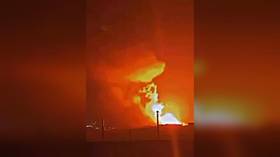NOVANEWS

General Hajizadeh cited as evidence data that he said was extracted from the drone’s computer hard drives revealing its operations in the months before it went down in Iran — either because it was shot down, as Iranian officials have claimed, or because it experienced a technical failure, as the Americans have said.
The drone, he said, had undergone repairs in California in October 2010 and returned to Afghanistan in November 2010, where American officials have acknowledged it operated, though without specifying where its missions took it. He added that the drone’s computer memory revealed that it had flown over the compound in Pakistan where Osama bin Laden was killed in an American raid in May 2011.
“Had we not accessed the plane’s softwares and hard disks, we wouldn’t have been able to achieve these facts,” General Hajizadeh said, according to the news agency Fars.
The White House and American intelligence officials declined Sunday to comment on the new claims, though independent experts expressed skepticism. They noted that the information about the drone’s activities — including its use in the Bin Laden raid — could have been drawn from public reports about the sophisticated aircraft. It was not clear what record of previous flights would have remained on the drone’s systems.
Senator Joseph I. Lieberman, independent of Connecticut and a member of the Senate’s Armed Services Committee, also suggested that Iran’s claims were probably overblown, though he said the drone’s loss was embarrassing.
“I think there is a history here of Iranian bluster, particularly now when they are on the defensive because of our economic sanctions against them,” he said on “Fox News Sunday,” referring to the increasingly punitive restrictions on Iran’s oil industry and central bank imposed by the United States and Europe because of the country’s nuclear program. “But, look, it was not good for the U.S. when the drone went down in Iran, and not good when the Iranians grabbed it.”
Mr. Lieberman called the drone “a very sophisticated piece of machinery” that he assumed had operated in Iran, “particularly at areas where we have reason to believe that they are working on a nuclear weapon.”
American officials have said that the drone’s onboard computers were programmed to destroy important information if it stopped responding to radio signals from its base. They said, however, that such security systems do not always function properly and that intelligence and military officials of other countries, including China and Russia, would undoubtedly try to persuade Iran to share any data or allow their experts to study it.
Dennis M. Gormley, an expert on drones and cruise missiles at the University of Pittsburgh, said Sunday that Iran’s claims strained credibility. “It’s hard for me to imagine no self-destruct or erase mechanism was embedded in the drone to destroy sensitive systems, including software.”
He added: “As someone who does monitor Iranian aerospace and missile claims closely, let me simply observe that they are preternaturally disposed to exaggeration.”



